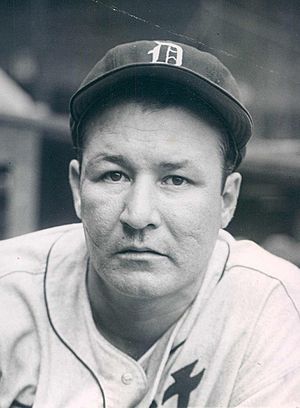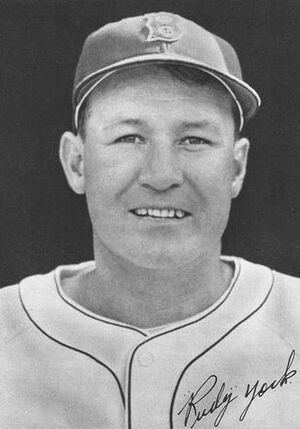Rudy York facts for kids
Quick facts for kids Rudy York |
|||
|---|---|---|---|

York with the Detroit Tigers in 1945
|
|||
| First baseman / Manager | |||
| Born: August 17, 1913 Ragland, Alabama, U.S. |
|||
| Died: February 5, 1970 (aged 56) Rome, Georgia, U.S. |
|||
|
|||
| debut | |||
| August 22, 1934, for the Detroit Tigers | |||
| Last appearance | |||
| September 20, 1948, for the Philadelphia Athletics | |||
| MLB statistics | |||
| Batting average | .275 | ||
| Home runs | 277 | ||
| Runs batted in | 1,149 | ||
| Teams | |||
|
|||
| Career highlights and awards | |||
|
|||
Preston Rudolph York (born August 17, 1913 – died February 5, 1970) was an American baseball player. He was also a coach, scout, and manager. Rudy played in Major League Baseball (MLB) from 1934 to 1948. He is best known for his time with the Detroit Tigers.
Rudy York was a seven-time All-Star. He broke Babe Ruth's record by hitting 18 home runs in one month as a rookie in 1937. In 1943, he led the American League in home runs and RBIs. He was a key player for the Detroit Tigers team that won the 1945 World Series.
He also played for the Boston Red Sox, Chicago White Sox, and Philadelphia Athletics. After his playing days, he worked in baseball as a manager, coach, and scout. He was honored by being inducted into the Michigan, Georgia, and Alabama Sports Halls of Fame.
Contents
Rudy York's Early Life and Baseball Beginnings
York was born in 1913 in Ragland, Alabama. His family moved to Georgia when he was young. His mother, Beulah York, worked in textile mills to raise Rudy and his four siblings. His great-grandmother was a full-blooded Cherokee.
In the late 1920s, Rudy's family moved to a mill town near Cartersville, Georgia. Rudy worked at the mill with his mother. He also became the star player for the ATCO baseball team from 1930 to 1933.
Rudy York's Professional Baseball Career
Starting in the Minor Leagues (1933–1936)
Rudy York began playing professional baseball at age 19. In 1933, he played for several minor league teams. These included the Knoxville Smokies, Shreveport Sports, and Beaumont Exporters.
He continued in the minor leagues in 1934. He played for Beaumont and the Fort Worth Cats. He briefly joined the Detroit Tigers late in the season. He played in three games but only got one hit.
In 1935, York played first base for Beaumont. He had a .301 batting average and led the league with 29 home runs and 114 RBIs. He was named the Most Valuable Player in the Texas League. However, the Tigers already had Hank Greenberg at first base.
In 1936, Greenberg was injured. But the Tigers traded for another player instead of calling up York. Rudy played first base for the Milwaukee Brewers. He hit .334 with 37 home runs. He was named the Most Valuable Player in the American Association.
Becoming a Star with the Detroit Tigers (1937–1945)
York finally played a full season with the Tigers in 1937. With Greenberg back, York played other positions. He played 41 games at third base and 54 games as a catcher. He hit .307 with 35 home runs and 101 RBIs. He hit 18 home runs in August, breaking a record held by Babe Ruth.
In 1938, York was the Tigers' main catcher. He played 116 games there and 14 games in left field. He hit .298 and was chosen for the All-Star team. He ranked among the top players with 33 home runs and 128 RBIs.
In 1939, York shared catching duties. He played 67 games at catcher and 11 at first base. He still hit well with a .307 batting average and 20 home runs.
In 1940, the Tigers moved Hank Greenberg to left field. This allowed York to play his natural position at first base. This move worked great for the team. York and Greenberg were a powerful duo. They helped the Tigers win the American League championship. In the 1940 World Series, the Tigers lost to the Cincinnati Reds.
When Greenberg joined the military in 1941, York became the Tigers' main hitter. He played 155 games at first base and was selected for his second All-Star game. He hit 27 home runs and 111 RBIs.
In 1942, York was an All-Star again. He hit a two-run home run in the first inning of the All-Star Game. This helped the American League win 3–1.
York struggled at the start of the 1943 season. Fans even booed him. But he bounced back in the second half. He hit 17 home runs in August. He ended up leading the American League with 34 home runs and 118 RBIs. He was chosen for his fifth All-Star team.
In 1944, York was selected to the All-Star team for the sixth time. He ranked among the league leaders with 18 home runs and 98 RBIs. He also led first basemen in turning double plays.
In 1945, York played 155 games at first base. The Tigers team won the American League championship. They then defeated the Chicago Cubs in the 1945 World Series. York was a strong hitter for the team.
After the 1945 season, the Tigers planned to move Hank Greenberg back to first base. So, on January 3, 1946, they traded York to the Boston Red Sox.
Playing for the Boston Red Sox (1946–1947)
In 1946, York played 154 games at first base for Boston. He led all first basemen in putouts, assists, and double plays. He also had 119 RBIs. He hit two grand slams in one game in July 1947. York, Ted Williams, and Bobby Doerr helped Boston win the American League championship. In the 1946 World Series against the St. Louis Cardinals, he hit game-winning home runs in Game 1 and Game 3. However, St. Louis won the series.
In 1947, York started 48 games for the Red Sox. His batting average dropped to .212. On June 14, 1947, the Red Sox traded York to the Chicago White Sox.
Finishing His Career (1947–1948)
After joining the White Sox, York played 102 games at first base. He had a .243 batting average with 15 home runs and 64 RBIs. The White Sox released him in January 1948.
In February 1948, York signed with the Philadelphia Athletics. He played in only 31 games and hit just .157. His last major league game was on September 20, 1948.
Rudy York's Career Highlights and Statistics
In his 13 seasons in Major League Baseball, Rudy York had a .275 batting average. He collected 1,621 hits and hit 277 home runs. He also had 1,149 RBIs. He was chosen for the All-Star Game seven times. His 239 home runs as a Tiger rank eighth in the team's history.
Even though some people thought his fielding was not perfect, York was a good defensive player. He led American League first basemen in fielding percentage in 1947. He also led in assists in 1942, 1943, and 1946. He led in putouts in 1946 and 1947, and in double plays in 1944 and 1946.
Rudy York as a Manager, Coach, and Scout
After his playing career, York continued in baseball. He was a player-manager for the Youngstown/Oil City Athletics in 1951. He later worked for the Georgia Forestry Commission in 1953.
In 1956, he returned to baseball as a scout for the New York Yankees. In 1957, he managed the North Platte team for the Cleveland Indians.
In 1958, York rejoined the Boston Red Sox. He was a coach for their minor league team, the Memphis Chicks. In 1959, he became the batting coach for the MLB Red Sox. He even served as the team's acting manager for one game on July 3, 1959.
In 1963, York became a coach for the Reading Red Sox. In 1964, he managed the Statesville Colts. He then worked as a scout for the Houston Astros in 1965.
Rudy York's Family, Later Years, and Tributes
Rudy York married Violet Dupree in 1931. They had three children: Mary Jane, Joe, and Blanche.
After baseball, York worked as a house painter in Cartersville, Georgia. He developed lung cancer and passed away in February 1970 at age 56. He was buried in Cartersville.
In 1972, a baseball field in Cartersville was renamed Rudy York Field in his honor. A monument and plaque were also dedicated to him.
York was inducted into the Michigan Sports Hall of Fame in 1972. His family attended the ceremony. He was also inducted into the Georgia Sports Hall of Fame in 1977 and the Alabama Sports Hall of Fame in 1979.
See also
- Batters with two Grand Slams in the same baseball game
- List of athletes on Wheaties boxes
- List of Major League Baseball career home run leaders
- List of Major League Baseball career runs batted in leaders
- List of Major League Baseball annual runs batted in leaders
- List of Major League Baseball annual home run leaders
 | Valerie Thomas |
 | Frederick McKinley Jones |
 | George Edward Alcorn Jr. |
 | Thomas Mensah |


